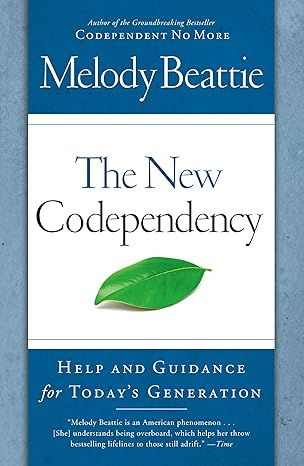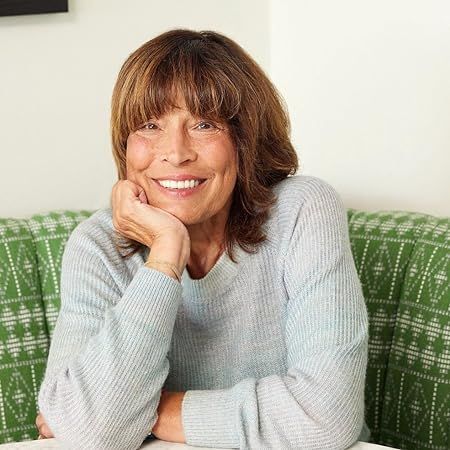The New Codependency: Help and Guidance for Today's GenerationHardcover
4.6
-
2,230 ratings
The New Codependency is an owner’s manual to learning to be who you are and gives you the tools necessary to reclaim your life by renouncing unhealthy practices.
In Codependent No More, Melody Beattie introduced the world to the term codependency. Now a modern classic, this book established Beattie as a pioneer in self-help literature and endeared her to millions of readers who longed for healthier relationships. Twenty-five years later concepts such as self-care and setting boundaries have become entrenched in mainstream culture. Now Beattie has written a followup volume, The New Codependency, which clears up misconceptions about codependency, identifies how codependent behavior has changed, and provides a new generation with a road map to wellness.
The question remains: What is and what is not codependency? Beattie here reminds us that much of codependency is normal behavior. It’s about crossing lines. There are times we do too much, care too much, feel too little, or overly engage. Feeling resentment after giving is not the same as heartfelt generosity. Narcissism and self-love, enabling and nurturing, and controlling and setting boundaries are not interchangeable terms. In The New Codependency, Beattie explores these differences, effectively invoking her own inspiring story and those of others, to empower us to step out of the victim role forever. Codependency, she shows, is not an illness but rather a series of behaviors that once broken down and analyzed can be successfully combated.
Each section offers an overview of and a series of activities pertaining to a particular behavior—caretaking, controlling, manipulation, denial, repression, etc.—enabling us to personalize our own step-by-step guide to wellness. These sections, in conjunction with a series of tests allowing us to assess the level of our codependent behavior, demonstrate that while it may not seem possible now, we have the power to take care of ourselves, no matter what we are experiencing.
Read more
Kindle
$14.99
Available instantly
Audiobook
$0.00
with membership trial
Hardcover
$2.38
Paperback
$9.49
Ships from
Amazon.com
Payment
Secure transaction
ISBN-10
1439102147
ISBN-13
978-1439102145
Print length
288 pages
Language
English
Publisher
Simon & Schuster
Publication date
December 28, 2009
Dimensions
5.5 x 0.8 x 8.44 inches
Item weight
9 ounces
Product details
ASIN :
B001NLL7SO
File size :
1580 KB
Text-to-speech :
Enabled
Screen reader :
Supported
Enhanced typesetting :
Enabled
X-Ray :
Enabled
Word wise :
Enabled
Editorial Reviews
Review
"'Codependent' is in the dictionary because of Melody Beattie. Her book is required reading." -- Christine Stapleton, Palm Beach Post
From the Back Cover
In her first major work in decades, the follow-up to the national bestseller Codependent No More, Melody Beattie identifies how codependent behavior has changed and shows listeners how to get back their lives by choosing behaviors that work for them.
About the Author
Melody Beattie ha escrito numerosos libros sobre el crecimiento y las relaciones personales, y su mensaje se basa en la sabiduría curativa de los Doce Pasos, el cristianismo y las religiones orientales. Con la publicación en 1986 de Ya No Seas Codependiente, Melody se convirtió en una de las principales voces de la literatura de autoayuda cautivando a millones de lectores empeñados en tener relaciones más sanas. Ella vive en Malibu, California.
Sample
Excerpt. © Reprinted by permission. All rights reserved.
SECTION ONE
Crossing Lines and Getting Back over Them Again
1 Taking Care of Ourselves
I know what it's like to lose yourself so badly that you don't know if there's a you or ever was one. I spent thirty years not knowing what boundaries were and another ten learning to set them. I gave until I was depleted and needed someone to take care of me. I threatened, begged, hinted, and manipulated to get what I wanted. I was convinced that I knew what was best for other people. I got so busy teaching them their lessons that I forgot to learn mine.
Within minutes of meeting a man, I was sure I'd met my soul mate. A few hours later, I'd fantasize about the wedding. That's how it happened on television. Isn't that how it happened in life? I'd spend two years trying to get into a relationship, and the next five trapped, clawing my way out. I obsessed until my head ached. Literally, it hurt. I didn't know what feelings were. Whenever I said I felt something, people said, "Don't feel that!"
Like millions of other women and men, I was victimized as a child. Instead of holding the perpetrators responsible, I blamed myself. There's something wrong with me, I thought. I didn't see the bad things that happened to me happening to anyone else. Feeling like we caused the problem is a legitimate stage of grief. Feeling ashamed is normal when we've been abused. Blaming ourselves is a survival skill. It helps us feel in control when life doesn't make sense and being abused doesn't make any sense at all.
Besides, aren't women supposed to suffer? We sacrifice ourselves. I became a martyr. I thought taking care of other people was my job. If I took care of them, I hoped they'd return the favor and take care of me. But that didn't happen. People expected me to take care of them once I started that pattern. There were many reasons I didn't take care of myself. The word no wasn't in my vocabulary. Good people were selfless. Loving myself was out of the question. Selfish! But the biggest reason I didn't take care of myself is that I didn't know how to.
Many of us didn't (or don't) know about self-care. It wasn't written about in books or talked about in school. We get user manuals for simple products, but we don't get a handbook for life. We stumble through complex situations, figuring things out for ourselves. Controlling and taking care of others -- the entire package of codependent behaviors -- become survival tools, living skills that we think will keep us safe. Then one day these behaviors turn on us. Our relationships and lives stop working and we don't know why. By then these survival behaviors are habits. They're all we know how to do.
If I had the years back I spent worrying about how the things I couldn't control were going to turn out, I'd have a third of my life to live over. That would be a life in which I wouldn't feel responsible for everyone or feel guilty all the time. I wouldn't waste energy controlling, enabling, and obsessively rescuing people -- the "helpful" things codependents do that don't really help. I'd let people take care of their responsibilities and I'd take care of mine. I wouldn't let people hurt me. I'd set boundaries -- say no. I wouldn't do only what other people wanted me to do; I'd do what I wanted, too. This time my giving would come from my heart, and my helping would actually help. I wouldn't judge everything that happened as wrong, including what I did, said, thought, and felt. I'd let life unfold, people be who they are, and I'd let myself be me. This time, I'd have the courage to experience true love.
I'd trust my intuition. If something didn't feel right, I'd know it probably wasn't. If I felt sad, I'd cry. If I felt angry, I'd feel that. I wouldn't ignore emotions until I imploded in illness or exploded in rage. I'd get out of my head and into my heart. I'd deal with my and others' feelings without all the drama; as much as possible I'd handle uncomfortable situations with diplomacy and tact. I wouldn't feel obligated and trapped. I'd know I had choices -- whether that means choosing attitude, gratitude, meditation, or prayer. Instead of protecting myself with fierce independence, I'd ask for help. I wouldn't be controlled by people and external events. My control center would be where it belongs -- in me. I wouldn't let other people's approval determine whether or not I approved of myself. I'd be energized by nature, God, and Life. I wouldn't drain other people, and I wouldn't let them drain me so much that my battery would die.
My relationships would be equal ones. I'd share power instead of one of us controlling and the other being controlled. I wouldn't have to create chaos to feel alive; I'd know I'm real. As one friend reminds me, instead of running headfirst into trouble, I'd go around it whenever I could (without resorting to denial). I know the value of peace. I'd create beauty, be of service, and have fun. I'd live and love at the same time. I'd admit my mistakes. But I'd also appreciate what I did well and let myself enjoy success.
This time I'd know what it means to love and take care of myself.
2 How to Use This Handbook
To prepare for writing this handbook, I reread books I wrote years ago: Codependent No More (1985-86), Beyond Codependency (1988-89), The Language of Letting Go (1990), and The Codependents' Guide to the Twelve Steps (1990). I was surprised by how much I have changed. I barely recognized who I am now compared to who I was back then.
When I first wrote about codependency, I couldn't get theword past my computer's spell-checker. Most of the world didn't recognize the word yet either. For a book originally rejected by twenty publishers ("Nice idea," they said, "but there aren't enough codependents to make publishing the manuscript worthwhile"), Codependent No More -- strictly by word of mouth -- became a best-seller. It hit the lists and is still a backlist best-seller. My Beverly Hills internist read it as part of his medical training. It's part of many school and college curriculums. Therapists recommend it to patients. Thousands of people give it to family and friends. It's read in treatment centers, recovery groups, and by people around the world searching for how to make the pain from self-neglect stop. The subject of codependency and how to recover from it struck a universal nerve.
Naming that pain was like discovering fire -- a fire that people still discover each month as thousands begin the journey we started back then.
"We're part of a groundswell movement that's come into its own time," I wrote in Beyond Codependency. "Media and public attention may subside. But recovery from codependency is more than a fad. We started the journey of self-care and self-love. We're not stopping now."
Those words were prophetic. Concepts such as letting go, detachment, setting boundaries, and self-care mainstreamed. They worked their way into the culture. Ideas previously unknown or talked about only by small groups of recovering people are now discussed almost anywhere, from coffee shops to TV. Ideas that originated with the codependency recovery movement are now how millions of people -- whether or not they're in recovery -- live.
Four of the fourteen books I've written are devoted to codependency I didn't think I'd ever say this, but those four aren't enough. I'm writing this book to clarify confusion, discuss new information, write about how codependency has mutated, address new support options, and remind us about what we learned.
Although I've changed significantly since writing Codependent No More, I still step in codependent puddles. I might get hooked into someone's stuff, let their problems control me, over-engage, or start reacting instead of taking right action. I'll let family conditioning affect me, neglect to set boundaries, or shut down emotionally. There are times I have to slam on the brakes, STOP, and remember to take care of myself. I don't sink in quicksand like I used to, but sometimes I revert to survival mode. That's yesterday's news.
I don't call that relapsing. Caring about people we love, feeling victimized when we're betrayed, giving our all to people we love, or wanting to control people because we're watching them destroy themselves and hurt us doesn't mean we're sick. These are natural reactions. Codependency is about normal behaviors taken too far. It's about crossing lines.
This book is written for beginners and those further down the taking-care-of-themselves road. It offers practical help for people recovering from chemical dependency when they bottom out from codependency, usually after being sober anywhere from seven to ten years. The seven-year mark for recovering alcoholics and addicts is a widely accepted but unofficial recovery rule of thumb. After people stop drinking, they discover there are many things other than alcohol and drugs that they can't control, a rite of passage that could be dubbed "the Second Great Surrender." We let go of all illusions of control.
I also wrote this book for people who want to learn more about behaviors such as setting boundaries or dealing with feelings, but who don't want or need to go to treatment, therapy, or attend recovery groups. You don't have to label yourself codependent and embark on a grand transformation to benefit from this book. Instead you can learn about specific behaviors that will help you take better care of yourself. This book complements my other writing, but the material in here is fresh. This is an upgrade, building on and enhancing the work I did before, like when Windows evolved from DOS. This book can be used with my other books or by itself.
The material is divided into sections, the sections into chunks. It's structured like a shopping mall directory. Locate the spot that says YOU ARE HERE and you'll see how to get where you're going next. Section Two -- Breaking Free from the Control Trap and Getting Some Grace -- offers alternatives to codependent behaviors.
Read more
About the authors
Melody Beattie
Melody Beattie is one of America’s most beloved self-help authors and a household name in addiction and recovery circles. Her international bestselling book, Codependent No More, introduced the world to the term “codependency” in 1986. Millions of readers have trusted Melody’s words of wisdom and guidance because she knows firsthand what they’re going through. In her lifetime, she has survived abandonment, kidnapping, sexual abuse, drug and alcohol addiction, divorce, and the death of a child. “Beattie understands being overboard, which helps her throw bestselling lifelines to those still adrift,” said Time Magazine.
Melody was born in St. Paul, Minnesota in 1948. Her father left home when she was a toddler, and she was raised by her mother. She was abducted by a stranger at age four. Although she was rescued the same day, the incident set the tone for a childhood of abuse, and she was sexually abused by a neighbor throughout her youth. Her mother turned a blind eye, just as she had denied the occurrence of abuse in her own past.
“My mother was a classic codependent,” Melody recalls. “If she had a migraine, she wouldn’t take an aspirin because she didn’t do drugs. She believed in suffering.” Unlike her mother, Melody was determined to self-medicate her emotional pain. Beattie began drinking at age 12, was a full-blown alcoholic by age 13, and a junkie by 18, even as she graduated from high school with honors. She ran with a crowd called “The Minnesota Mafia” who robbed pharmacies to get drugs. After several arrests, a judge mandated that she had to “go to treatment for as long as it takes or go to jail.”
Melody continued to score drugs in treatment until a spiritual epiphany transformed her. “I was on the lawn smoking dope when the world turned this purplish color. Everything looked connected—like a Monet painting. It wasn’t a hallucination; it was what the Big Book of Alcoholics Anonymous calls ‘a spiritual awakening.’ Until then, I’d felt entitled to use drugs. I finally realized that if I put half as much energy into doing the right thing as I had into doing wrong, I could do anything,” Beattie said.
After eight months of treatment, Melody left the hospital clean and sober, ready to take on new goals: helping others get sober, and getting married and having a family of her own. She married a former alcoholic who was also a prominent and respected counselor and had two children with him. Although she had stopped drinking and using drugs, she found herself sinking in despair. She discovered that her husband wasn’t sober; he’d been drinking and lying about it since before their marriage.
During her work with the spouses of addicts at a treatment center, she realized the problems that had led to her alcoholism were still there. Her pain wasn’t about her husband or his drinking; it was about her. There wasn’t a word for codependency yet. While Melody didn’t coin the term codependency, she became passionate about the subject. What was this thing we were doing to ourselves?
Driven into the ground financially by her husband’s alcoholism, Melody turned a life-long passion for writing into a career in journalism, writing about the issues that had consumed her for years. Her 24-year writing career has produced fifteen books published in twenty languages and hundreds of newspaper and magazine articles. She has been a frequent guest on many national television shows, including Oprah. She and her books continue to be featured regularly in national publications including Time, People, and most major periodicals around the world.
Although it almost destroyed her when her twelve-year-old son Shane died in a ski accident in 1991, eventually Melody picked up the pieces of her life again. “I wanted to die, but I kept waking up alive,” she says. She began skydiving, mountain-climbing, and teaching others what she’d learned about grief.
Read more
Reviews
Customer reviews
4.6 out of 5
2,230 global ratings
Daisy S
5
The best Codependency Book I have read. My favorite Melody Beattie book! Very helpful and meaningful book!
Reviewed in the United States on February 18, 2015
Verified Purchase
Having read and benefited from several of Melody Beattie books I decided to purchase her newest book regarding Codependency. So glad that I did so. This book is so thought provoking and has been so enlightening for me!
After re-reading several of Melody Beattie books (Co-Dependent No More, Beyond Co-Dependency, Journey of the Heart, Language of Letting Go, and also Co-Dependent Guide to the Twelve Steps, I found this book to be her best work ever and below is why this is now my favorite Melody Beattie book:
-
Taking Care of Ourselves section - There is more information in this part of this book and more updated then her previous books. For example, in this beginning section, she shares some of her experiences. This sets the stage for more of how to take care of ones self that is explained more later into this book.
-
My favorite part of this book (most helpful one) is SECTION TWO ..The Evolving Art of Self Care. This part gives two steps to help right away with Co-Dependency - 1) Identify Teachers and Lessons Learned 2) Expressing Gratitude is a powerful practice She suggests writing a Gratitude Journal and it does work!
-
Also in Section Two is SETTING BOUNDARIES - This one has a checklist of how to set boundaries and how to set GOOD BOUNDARIES with people. This works in any type of relationship, with a partner, co-worker, friend, etc. This section has wonderful and to the point checklists that are easy to follow! And she even has a section on what Boundaries ARE NOT!
-
The section on Is it Love or Control? This explains the difference between normal love and compassion vs a controlling relationship. Ms Beattie used her own life experiences to explain examples of controlling and more.
-
The last section in this book called How To Find Help For Almost Anything - this is a must read section as it gives a number to call for help in all 50 states.
-
This book is updated and NO FLUFF, just meaningful reading in my opinion.
Highly recommend this book for anyone who wants to take better care of themselves whether in a relationship or not!
Read more
70 people found this helpful
Lauren Bastaparis
5
A new take on helpful ideas
Reviewed in the United States on January 11, 2012
Verified Purchase
I have always been a fan of Melody Beattie's work, and I have benefited enormously from it since the old days of Codependent No More. I have not been in a relationship with someone addicted, but I nevertheless recognized myself in the description of the Codependent. There were so many similarities: not being able to take care of myself, obsessing about other people, taking care of everyone's needs (apart from my own, that is), not having boundaries. I seemed to be a textbook codependent, except that I did not get involved with alcoholics. So I just went along with what she had to say and read several of her books.
The New Codependency is one of the best ones. It has all the usual qualities of her work:
*She uses an empowering tone: of course you can make it. And to be honest, when she describes her life of a former junkie, you cannot help thinking: well, if she managed to get out of this mess, Surely I can get out of mine. *Her book is packed with examples. The fact of the matter is, I can see problems and solutions so much more easily when I read about someone else. Examples allow me to do that. *There is a lot of practical, down to earth advice. I cannot count the number of books I've read which describe my dreadful problems, but then leave me there with a vague "well I guess you need therapy" chapter. I hate it. Don't talk to me about my issues if you are not able to offer one hint of advice on how to solve them.
In The New Codependency, Melody Beattie tackles important concepts she wrote about before (boundaries, taking care of oneself, deprivation, control...), but with a higher level of maturity . Because she does not go back to the basics, I would advise not to read this book without reading first her earlier work. If you have, then it provides additional hindsight and a wiser point of view.
There are also new ideas. She insists to de-stigmatize codependency, explaining that it is just "normal behaviours, plus", that it is just a stage of grief - and I must say I find this new idea really interesting. There is a chapter about nurturing that I liked - she did not write about it earlier because she did not know what it was. And there is a whole section about emotions that I found really useful - I am one of these folks who have difficulties simply feeling.
Read more
163 people found this helpful
Sharon Kay Peters
5
Co-dependency Updated!
Reviewed in the United States on April 30, 2024
Verified Purchase
Anything by Melody Beattie is GREAT! I like her explanation of co-dependency and not having to be in a relationship with an addict to benefit from this book. It helps you be emotionally balanced….which all of us need!😊💕
3 people found this helpful
Jeff
5
A look in the mirror
Reviewed in the United States on July 26, 2024
Verified Purchase
If you think you may need this book, then you do. I've listened on audible multiple times and have the book and workbook
JSmith
5
Love
Reviewed in the United States on October 9, 2017
Verified Purchase
It's ok to love someone who is addicted & cycles through mental issues. It doesn't make you sick. It makes you human, living in a world that's exceedingly tough for some souls, bodies & chemistries. What does make you sick is stalling your own dreams & plans to be their solid. What does make you sick is rescuing, being attached to an outcome with this person, or relying on them for your self worth. Only you can do that. And sometimes the most helpful thing is to say no. No to paying for things because that enables their poverty. No to staying up late with them because that enables their anxiety and increases yours. No to picking up the substances, let them get their own. You can't control the illness, the cycle, the addictions, their pain, or their decisions. But you can take care of yourself. And in healing, you can communicate with them in a respectful, loving, adult way that sets the bar higher for both of you. You can leave at anytime, so remember that this is a choice your soul made for growth, and not a life sentence. Take the beautiful parts and learn to smile at and let go of the crazy. Extract yourself from the parts that make your heart race or jump. This isn't about you. It's about them. Codependency is a simple case of mistaken identity.
Read more
268 people found this helpful
Top Melody Beattie titles
View all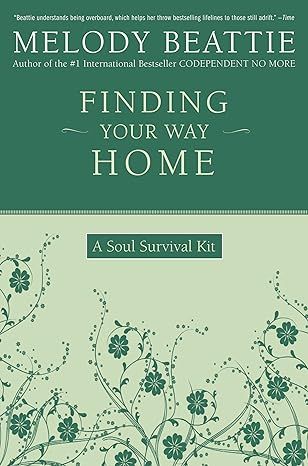
Finding Your Way Home: A Soul Survival Kit
4.6
-
462
$10.29
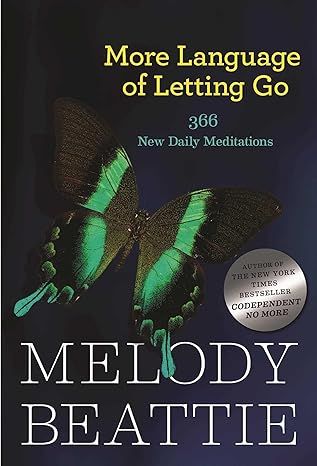
More Language of Letting Go: 366 New Daily Meditations (Hazelden Meditation Series)
4.7
-
1,292
$0.99
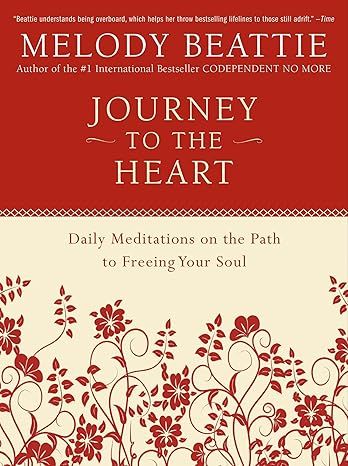
Journey to the Heart: Daily Meditations on the Path to Freeing Your Soul
4.8
-
4,646
$0.99
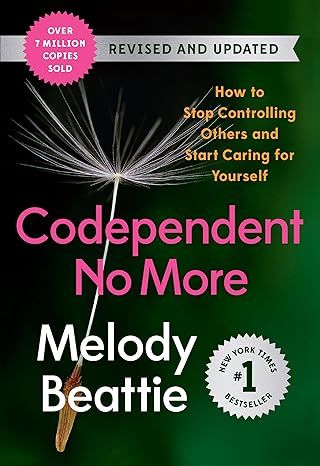
Codependent No More: How to Stop Controlling Others and Start Caring for Yourself (Revised and Updated)
4.7
-
18,074
$0.99
Best Sellers
View all
The Tuscan Child
4.2
-
100,022
$8.39

The Thursday Murder Club: A Novel (A Thursday Murder Club Mystery)
4.3
-
155,575
$6.33

Sapiens: A Brief History of Humankind
4.6
-
140,302
$13.49

The Butterfly Garden (The Collector, 1)
4.3
-
88,556
$9.59

Things We Hide from the Light (Knockemout Series, 2)
4.4
-
94,890
$11.66

The Last Thing He Told Me: A Novel
4.3
-
154,085
$2.99

The Perfect Marriage: A Completely Gripping Psychological Suspense
4.3
-
143,196
$9.47

The Coworker
4.1
-
80,003
$13.48

First Lie Wins: A Novel (Random House Large Print)
4.3
-
54,062
$14.99

Mile High (Windy City Series Book 1)
4.4
-
59,745
$16.19

Layla
4.2
-
107,613
$8.99

The Locked Door
4.4
-
94,673
$8.53
